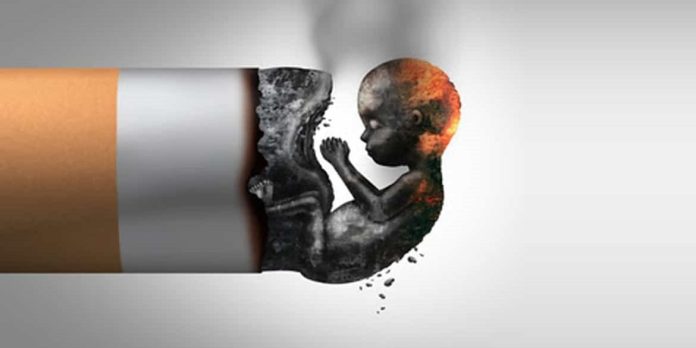Professor of Reproductive Endocrinology, Oladapo Ashiru, warns that the effects of heavy smoking by fathers can cut short the ability of their daughters to achieve pregnancy later in life.
The IVF specialist also warns that being a heavy smoker dad can make a child born to such men to develop childhood leukemia.
He adds that smoking can have adverse on fertility, especially for people who are trying to conceive.
Ashiru, who, alongside Prof. Osato Osagie, gave Africa its first IVF baby, says several studies have shown a causal association between cigarette smoking and infertility in both men and women.
“Infertility is a global health issue. It include male factors, female factors, combined factors, and idiopathic (unknown) aetiologies. It is a multidimensional problem with socio-economic, cultural, and spiritual implications. In addition, it is a cause of marital disharmony and distress to couples.
“Childbearing and raising children are significant events among couples, especially those of African descent, strongly associated with the ultimate goals of fulfillment, happiness, and family completeness,” Ashiru posits.
According to WHO, approximately 34 million women, predominantly from developing countries, have infertility problems that result from maternal sepsis and unsafe abortion (long-term maternal morbidity resulting in a disability). Infertility in women has ranked the 5th highest global severe impairment (among populations under the age of 60).
Although infertility is a global menace, variations in incidence are associated with geographical differences. For instance, the most frequent cause observed, especially in Western countries, is an advanced maternal age; as opposed to sexually transmitted diseases (STDs) in sub-Saharan Africa.
approximately 34 million women, predominantly from developing countries, have infertility problems that result from maternal sepsis and unsafe abortion
Definition of infertility
Infertility is the inability of a couple to achieve spontaneous conception after trying for at least six months without using any contraception despite adequate (at least two to three times on alternate days) sexual (peni-vaginal) intercourse.
Aside from advanced maternal age, STDs, and congenital/genetic causes, other reasons for infertility include endocrine causes, chemotherapy, exposure to radiation, etc. In addition, lifestyle patterns and environmental pollutants such as cigarette smoking play a crucial role in infertility.
Smoking effects
A study published by the US Centre for Disease Control and Prevention (CDC) shows that while smoking rates among women worldwide have fallen recently, the unhealthy habit is a significant cause of newborn deaths, pre-term births, and babies with low birth weight. Indeed, a systematic review of the scientific literature on the impact of cigarette smoking and smoke constituents revealed that all stages of reproductive functions are targets of cigarette smoke.
The most frequent cause of infertility, especially in Western countries, is advanced maternal age, compared to sexually transmitted diseases (STDs) in sub-Saharan Africa.
Hence, it is critical to note the consequences of cigarette smoking on infertility. In the UK alone, smoking during pregnancy is responsible for about 5,000 miscarriages, 3,000 perinatal deaths, and approximately 2,000 premature births yearly.
Scientific studies note that women who smoke take longer to conceive than those who do not, as tobacco use affects the receptivity of the uterus, particularly among heavy smokers.
There’s also a higher incidence of ectopic pregnancies among smokers; while low-level smoking, ‘side stream,’ and passive smoking can also harm fertility.
Indeed, female smokers undergoing assisted reproductive treatment have a significant negative outcome compared to non-smokers. A study even showed a 50% decline in implantation rate in smokers.
In males, smoking can affect protamine, a protein essential for sperm production. Males born to women who smoked during pregnancy are at risk of having small testes, low sperm count, and low sperm concentration. These men also have a high number of malformed sperm. Traces of nicotine were also detected in the semen of such men. Nicotine reduces sperm motility and their fertilization potential.
Males born to women who smoked during pregnancy are at risk of having small testes, malformed sperm, low sperm count, and low sperm concentration
In men, the effects of smoking manifest in a reduction in sperm production, an increase in oxidative stress, and DNA damage.
In females, smoking affects the ovaries adversely. The degree of damage is dependent upon the quantity and length of time a woman smokes. Nicotine and other hazardous substances in cigarettes interfere with the body’s ability to create estrogen, which regulates ovulation, among others.
Ashiru warns, “Smokers are 60% more likely to be infertile than non-smokers. Smoking decreases the chances of IVF producing a live birth by 34% and increases the risk of an IVF pregnancy miscarriage by 30%. Some damage is irreversible, but stopping smoking can prevent further damage.”
How does smoking affect infertility in the male?
The incidence of impotence is approximately 85% higher in male smokers than non-smokers and is a significant cause of erectile dysfunction (ED). Smoking causes infertility by encouraging arterial narrowing.
Fathers who smoke heavily (more than 20 sticks per day) at conception increase the child’s risk of childhood leukemia, while it shortens the reproductive lifespan of their daughters.
Evidence has also suggested damage to female infertility in utero if the woman’s mother was exposed to secondhand smoke while pregnant. Also, women exposed to cigarette smoke while undergoing IVF or other assisted reproduction technologies treatment can have adverse pregnancy outcomes. More epidemiological research is needed to bolster these suggestions.
Fathers who smoke heavily increase the child’s risk of childhood leukemia, while it shortens the reproductive lifespan of their daughters
Meanwhile, non-smokers exposed to secondhand smoke are at risk of difficulty becoming pregnant, and they also risk spontaneous abortion, having babies with congenital malformations, or having stillbirths, according to experts.
This story was extracted from a post on LinkedIn by the MART Group of Health Services


